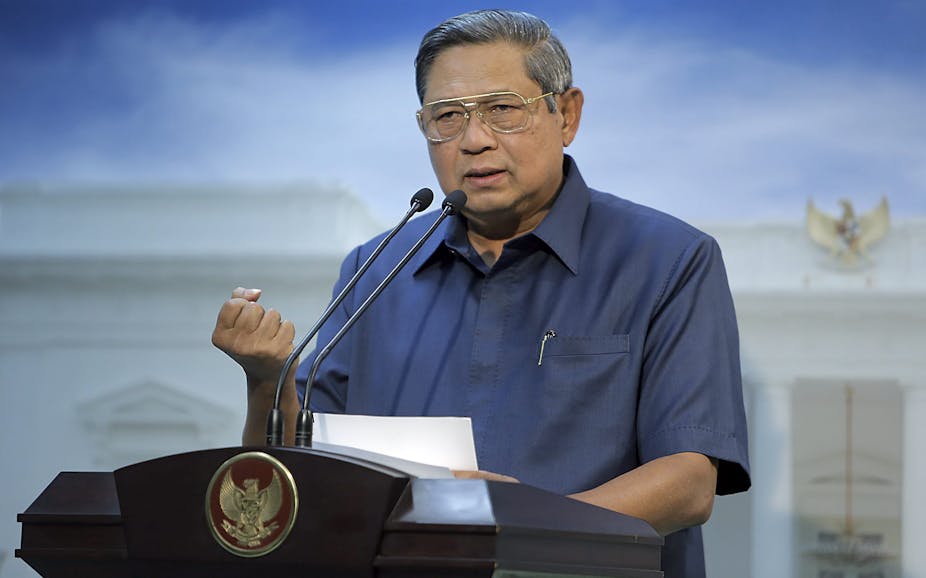When The Guardian Australia and the ABC broke the news that Australian intelligence agencies had been monitoring the phones of Indonesian president Susilo Bambang Yudhoyono, his wife and leading Cabinet ministers in August 2009, it was clear that relations between the new Abbott government and the veteran Yudhoyono government were about to face some very stormy weather.
Australian prime minister Tony Abbott, who clearly felt constrained about what aspects of Australia’s intelligence he could comment on, initially seemed to hope that with grace and polite firmness he could weather the storm. It is now clear that more is required. The question, however, is what more Abbott can do.
With intelligence and security co-operation between the two nations now put on ice and the prospect of a serious deterioration in bilateral operations to stop people smuggling an unpleasant certainty, Abbott has to redouble his efforts in publicly meeting Yudhoyono’s demands for a more meaningful response.
Should Abbott apologise? Can he apologise? Perhaps that all depends on what exactly is meant by apologising.
It has been suggested that Abbott should follow US president Barack Obama’s lead in apologising to German chancellor Angela Merkel over revelations that the NSA, under a program called Stateroom, had monitored her phone. Certainly, Obama’s response to Merkel represents something of a template, and a delineation of the constraints, for Abbott’s response to Yudhoyono.
This is all very reasonable but there are two things to bear in mind. First, Obama did not make a public apology to Merkel. The details are not clear but it appears Merkel initiated a call to Obama and there was an exchange which at least partly satisfied her concerns. Second, while Abbott might share in common with Obama a certain cool, precise, rational style of communication, Yudhoyono is an Indonesian president, not a German chancellor.
For Yudhoyono, as his stream-of-consciousness Twitter feed has made clear, the problem with Abbott’s eloquent response is that it lacks emotional substance. In the early hours of Tuesday morning, Yudhoyono tweeted that he was disturbed the Australian prime minister was “making light” of an important issue and “dismissing a serious matter as being merely normal business”.
Yudhoyono and Indonesian foreign minister Marty Natalegawa have continually returned to this issue, making it clear they expected much more from Abbott and his government. Abbott tried, and tried again. As recently as last night he addressed parliament, speaking of his deep concern at the offence caused to Yudhoyono and the damage done to one of Australia’s most important relationships.
From Jakarta’s point of view, however, this is clearly not enough. At the very least, Abbott should not follow Obama’s example and wait for his counterpart to call him. Rather, he needs to be seen to be earnestly initiating engagement.
At this point, the original facts of the matter are less important then perceptions of how much we care. Technically, the information revealed in the Snowden documents might not be particularly surprising for those who follow intelligence matters, including government ministers. But when an issue like this gets out in public, particularly at the end of an embattled president’s final term and the start of a long cycle of election campaigning, perception is everything.
Regardless of what precipitated them, the emotions that we are seeing expressed in Jakarta are genuine and their consequences deeply significant. Yudhoyono and his government have experienced a serious loss of face at a time when they least wanted it. Face-saving measures are needed urgently and they need to be substantial. Natalegawa has talked about “irreparable damage”. That may be hyperbole but it could quickly become reality.
Abbott is seriously constrained about what intelligence matters he can comment on and a technical apology of the sort that would satisfy lawyers might not be absolutely possible. But he can - and must - be seen to respond with deepest concern to the hurt and embarrassment suffered by his friends in Jakarta.
As revelations emerged last night about Australian Federal Police monitoring the phone calls of Australian politicians, Australia, like America, has received an unwelcome wake-up call. The damaging Snowden leaks speak to the need to periodically review intelligence practices and weigh up the cost of being caught spying on friends.
Everyone spies on everyone. It has always been so and always will be so, but the growth in the capacity of digital technology to vacuum up data and analyse vast quantities of information has led to a degree of capacity creep. It has also increased the likelihood and scale of damaging leaks. Our intelligence agencies need to operate with a high degree of secrecy but they also benefit from a certain degree of public accountability and transparency. Arguably, more is needed.
Abbott can certainly address this – in general terms – and commit to discussing it with his Indonesian counterparts so that together they can work towards building a relationship characterised by growing trust and co-operation.
The way forward will be difficult but the important thing now is that Indonesia sees that Australia cares, and cares deeply, about its hurt and its embarrassment and does all that it can to make amends. As is the case when any important relationship is in peril, too much is at stake to be seen to be doing anything less than giving this our all.
The past, and the facts about what might have happened, are not really the point – it is how much we are seen to care now that will determine where this goes next.

